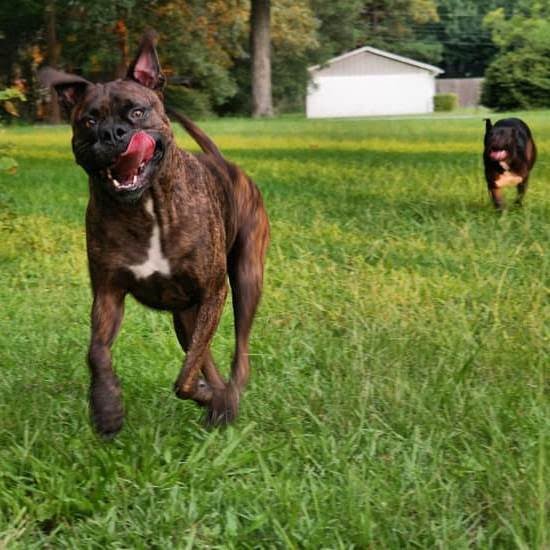Introduction
Dog daycare employee training is an important step in providing a safe and enjoyable experience for doggie daycare visitors. Dog daycare workers need specialized knowledge and skills to provide the best care for dogs in their facility. Training will teach employees how to read dog body language and recognize potential danger signs that could indicate aggression or health issues. They learn about managing and preventing fights amongst canines which can cause serious harm, both physically and emotionally. Employees also learn where to go if they do encounter a difficult situation, as well as how to appropriately handle disputes between customers to ensure a peaceful environment for all parties involved. Training also provides dog daycare staff with the knowledge on how to treat each pet with respect, empathy, and understanding so each individual animal feels safe and secure in their environment. Furthermore, training teaches employees proper safety procedures when handling different size dogs, as well as appropriate disciplinary methods when needed. Taking the time to properly train all dog daycare staff is essential for creating an environment of high-quality care for all visiting pets.
Setting Goals
Dog daycare employees are responsible for providing a safe and enjoyable experience to each doggy client that comes into their facilities. In order to ensure all clients have good experiences, dog daycare employees should set goals they need to learn and understand in order to properly look after the dogs. Depending on the specific facility, this may include learning about breed-specific behaviors and/or breed-specific management techniques. Additionally, it is important that dog daycare employees understand basic canine anatomy, health needs and characteristic behaviors. Proper emergency response protocols need to be learned as well, including how to react in case of medical emergency or aggression. Employees should also be taught how to administer medications if necessary, leash training techniques and dog playtime etiquette. It is important for the safety of not only the dogs but other staff members at the facility that everyone understands how to properly interact with canines in situations where stress or aggression may occur. Finally, customer service skills should be taught as well, so that clients receive a positive overall experience when visiting the facility. All these goals provide a foundation for safe and successful operations for any dog daycare business.
The Basics
Dog daycare employee training should cover topics such as proper animal handling, canine body language and behavior, establishing rapport with animals, providing basic medical care and administering medications. Additionally, employees should learn how to safety-proof the environment, prepare food and serve meals, create a variety of play and exercise opportunities, recognize signs of animal pain or stress, provide socialization opportunities for the animals under their care, create appropriate enrichment activities that meet the individual needs of each dog, clean up after their charges properly, keep detailed records on each animal’s health and behavioral patterns, recognize when conflicts arise between two dogs in their vicinity and have strategies for de-escalating these encounters. Dogs require compassion, respect and individualized treatment to feel comfortable in daycare environments; staff members should be trained to provide this kind of attention to all animals in their facility’s care.Employees should also receive instruction on pet first aid procedures in case a dog becomes injured or ill while under their supervision. They should review specific steps such as restraining an animal in a safe manner before administering treatments. Staff members must understand when to move forward with simple treatments such as antibacterial ointment for minor wounds versus seeking emergency veterinary help for severe injuries or illnesses. Employees must be well versed on how to clean up bodily waste so it cannot spread potential disease. Finally they must know what personal Protective Equipment is necessary at all times while working near animals. All staff members must also agree to follow any relevant local laws governing pet ownership and welfare when caring for animals in the facility.
Developing Rapport
One of the most important things for employees at dog daycare centers to learn is how to develop a healthy rapport with both dogs and their owners. It is essential that employees cultivate a friendly, yet professional environment. This requires active listening and a commitment to providing quality care and services.
First, it is important for employees to stay informed about different dog breeds and behaviors. Every breed has its own unique physical features, personality traits, and behavioral tendencies. Being educated on these aspects will help ensure the safety of all the dogs in daycare by helping the staff better recognize any potential problem behavior or misbehavior.
Second, it is important for staff to communicate with each other while they are interacting with the dogs and their owners. Being able to effectively communicate any concerns or questions with each other is essential for keeping up a friendly interaction between everyone involved.
Finally, building trust between employees and clients is key for developing a good rapport. Employees should strive to provide quality customer service as well as efficient handling of all cases within their specific areas of expertise. This will foster an atmosphere where both canine companions and human caregivers feel comfortable and secure when visiting the facility or seeking assistance from staff members. Allowing employee voices to be heard within the center will also allow for greater transparency between everyone participating in daycare activities. By demonstrating genuine interest in clients, whether human or canine, employees can provide a welcoming atmosphere that reinforces relationships formed during visits and reminds them why they keep coming back—because they know they are truly valued!
Recognizing Distinctions
When it comes to dog daycare employee training, learning how to recognize distinctions between dog breeds is essential. Dogs come in all shapes and sizes, and each breed has its own unique set of needs. It is important for daycare employees to gain insight into different canine breeds so that they can provide them with the best possible care.
Recognizing distinctions between dog breeds requires more than just knowing about the physical differences between them. While certainly acknowledging how breeds differ in size, color, and other distinguishing features is important, it is equally critical for employees to understand behavioral traits and tendencies as well. For instance, some small-breed dogs such as Chihuahuas may be prone to anxiety or react poorly to certain stimuli while larger breeds like German Shepherds may excel when exposed to an abundance of activity and intense exercise. Knowing the overtures associated with various canine species will ensure that daycare staff are prepared to address their individual characteristics accordingly. Additionally, learning proper restraint techniques based on a particular breed’s body type will better equip employees when managing animals within the facility.
Moreover, by gaining insight into various dog breeds’ specific dietary needs or preferred chew toys/play items it will help workers further tailor their service; providing custom care that pets both need and enjoy. Gathering some basic information on popular crossbreeds such as Labradoodles — that include elements from Labrador Retrievers and Poodles — will offer important insights into how those specific mixes behave compared to purebreds from either lineage; helping staff who may not be familiar with these types of canines apply appropriate approaches when witnessing behavior more indicative of one side of the family tree versus the other.
Addressing Problems
To ensure the safety of both dogs and employees at the dog daycare, it is essential that all employees attend training on how to identify and handle potentially dangerous situations. In addition to basic dog handling skills, employees should understand when and how to intervene if they observe disputes or aggressive behaviour between other dogs.
It is also important to understand common stress signals in dogs, such as growling, barking, snapping and lifted or curved lips. Knowing these signs helps employees determine a dog’s emotional state before attempting to intervene. Employees should be trained on appropriate methods for redirecting a dog’s attention away from the root cause of their agitation. For milder forms of agitation, using verbal commands and corrections can help bring behavioral issues under control without putting any individual at risk. However, if a situation escalates, physical intervention may need to take place with the aid of an additional staff member. In more extreme cases where a dog poses an imminent threat, it may need to be removed from the daycare immediately for its own safety and where necessary, referred for professional behavior assessment and/or management advice.
Enhancing Services
Animal care professionals who work in doggy daycare facilities must be well trained in understanding the behavior and needs of dogs. Providing additional care and services at the daycare requires employees to have a wide variety of knowledge areas. For example, they should be familiar with basic commands such as sit and stay, leash walking protocol, nutrition principles, enrichment activities that stimulate mental stimulation, approaches to handling aggression, proper coaching techniques when participating in doggy daycare activities with clients’ pets. In addition to these topics, daycare employees should receive training addressing regular toileting accidents or incidents of challenging behaviors due to illnesses or anxiety. Since illness can quickly spread among animals in close proximity at a daycare setting, employees should also be familiar with basic hygiene practices like hand washing hygiene after contact with any animals and utilizing the appropriate types of cleaning supplies on surfaces to help reduce the risk of infection or disease. Ultimately, training for additional care and services is important for keeping all pets healthy and safe.
Staying Current
One of the most important responsibilities of a dog daycare employee is to ensure that they are keeping their training knowledge and skills up-to-date. There are several strategies that can be used in order to accomplish this.
First, it is important for dog daycare employees to become familiar with popular trends in the pet care industry. Through online reading, seminars, and conferences, employees can stay informed on changes that take place in the industry such as new research findings, best practices and standards of care, safety precautions, technology advancements, customer service expectations and tips, and more. By having this foundational knowledge, employees will be better prepared to make decisions and shape strategies to serve their customers’ needs properly.
Second, it can be beneficial for an employee to seek out continued education opportunities such as workshops or self-led learning activities where relevant topics are discussed. Participating in education sessions will help give employees necessary tools and insight into areas such as customer service approaches, ways to improve services offered at the dog daycare facility or ideas for increasing popularity among customers.
Lastly, when possible, dog daycare employees should try to collaborate with peers by sharing information on programs from their own facilities that have been successful over time. Making connections with co-workers who have different perspectives or environment experiences can add another layer of value to an individual’s growth and development as a professional within the field. Ultimately staying updated on changes in the industry allows an employee flexibility while servicing clients’ changing needs; ensuring satisfaction which results in repeated business transactions leading toward success for both parties involved.
Conclusion
Investing in training for employees of a dog daycare is an essential part of a successful business. With well trained staff, the daycare can ensure that the dogs receive the best care possible and each dog is handled in a safe and appropriate manner. This investment pays off with not only better care of the dogs, but also improved customer satisfaction from pet owners who trust their furry family members to your business. Employee training also helps create an environment where every employee feels comfortable and can work together as a team to provide exceptional services. Furthermore, employee training ultimately encourages loyalty in both clients and employees, enhancing customer retention and workplace morale. Ultimately, investing in employee training for a dog daycare facility is one of the best investments you can make for not only the success of your business but also the safety and wellbeing of all those involved.

Welcome to the blog! I am a professional dog trainer and have been working with dogs for many years. In this blog, I will be discussing various topics related to dog training, including tips, tricks, and advice. I hope you find this information helpful and informative. Thanks for reading!





